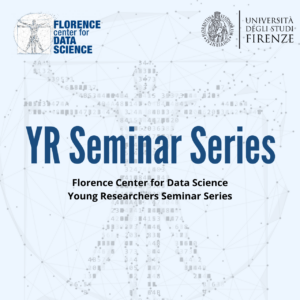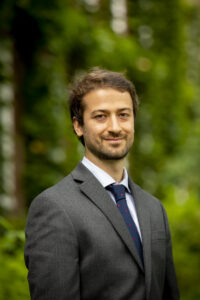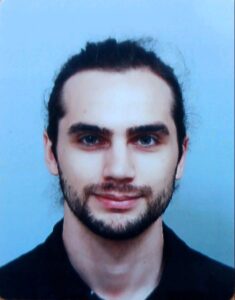Seminars

YR Seminar: Antonella Falini
15th OF october 2024, FROM 2.30 – 3.30 pM:
Dr. Antonella Falini, researcher at the Computer Science Department, University of Bari Aldo Moro, presented a seminar on
“Spline Quasi-Interpolation as an effective tool to enhance clustering performance”
Click here to access the abstract of the seminar

“Young Researchers Seminar Series” is a particular seminar series organized by the Florence Center for Data Science that invites young researchers and Ph.D. students to hold a lecture about their current research or academic work. It takes place several times during the year. People are invited to attend and the registration (free of charge) is available one week before the event on the website (under the Events page).

Matt DosSantos DiSorbo
22th May 2023
Matt DosSantos DiSorbo from Harvard Business School presented a seminar on
“Starting Strong: The Impact of Early Interventions on Employee Outcomes“
Abstract:
In randomized experiments with insufficient covariates, confounders can bias point estimates. We introduce rank estimates in factorial designs and discuss their relative robustness. We argue that, in many applied settings, identifying the top-ranked intervention is more critical than recovering exact point estimates. Using data from an experiment conducted at a large financial firm, our method provides evidence that interventions in the first week of an internship have the largest sustained effect on intern rating. Further, the data is suggestive that these early interventions have the greatest impact on interns eventually accepting an extended offer. This principle — intervene early — has important managerial implications.
The recording of the seminar is available here.

Riccardo Michielan
28th OF February 2023, FROM 2.30-4 PM:
Riccardo Michielan from University of Twente presented a seminar on
“Is there geometry in real networks?”
Click here to access the abstracts of the seminar

Iavor Bojinov
29TH OF JUNE 2022, FROM 4-5 PM:
Iavor Bojinov – Harvard Business School presented a seminar on
“Design & Analysis of Dynamic Panel Experiments“
Abstract: Over the past few years, firms have begun to transition away from the static single intervention A/B testing into dynamic experiments, where customers’ treatments can change over time within the same experiment. This talk will present the design-based foundations for analyzing such dynamic (or sequential experiments), starting with the extreme case of running an experiment on a single unit—what’s known as time-series experiments. Next, motivated by my work to understand if humans or algorithms are better at executing large financial trades, I will lay out a framework for designing and analyzing switchback experiments, a special case of time-series experiments. Then, I will explain how to extend this framework to multiple units and what happens when these units are subject to population interference (the setting where one unit’s treatment can impact another’s outcomes). Finally, if time allows, I will conclude with a brief discussion of an empirical study that leveraged over 1,000 experiments conducted at LinkedIn to quantify the additional benefits of adopting dynamic experimentation.

Dante Amengual
17th of June 2022, from 2-3 pm:
Dante Amengual – CEMFI presented a seminar on
“Hypothesis tests with a repeatedly singular information matrix“
Abstract: We study score-type tests in likelihood contexts in which the nullity of the information matrix under the null is larger than one, thereby generalizing earlier results in the literature. Examples include multivariate skew-normal distributions, Hermite expansions of Gaussian copulas, purely non-linear predictive regressions, multiplicative seasonal time series models, and multivariate regression models with selectivity. Our proposal, which involves higher-order derivatives, is asymptotically equivalent to the likelihood ratio but only requires estimation under the null. We conduct extensive Monte Carlo exercises that study the finite sample size and power properties of our proposal and compare it to alternative approaches.